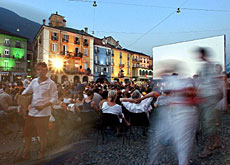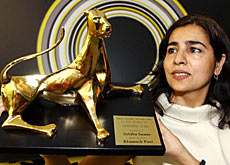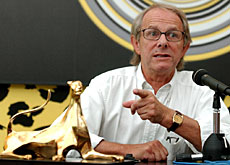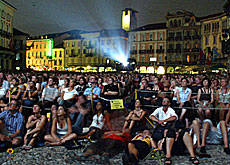Bignardi turns the camera on the press

This year’s Locarno film festival promises a huge variety of films from around world, many of which deal with topical subjects such as the role of the media in politics.
swissinfo spoke to artistic director Irene Bignardi about the line-up and how a retrospective on the world of journalism examines a subject close to her heart.
Bignardi, who has been director of the festival for three years, says that Locarno can still hold its own alongside the larger film festivals.
Apart from the “Newsfront” retrospective, which contains 91 works, 18 films will be competing for the festival’s coveted Leopard trophies.
swissinfo: The retrospective this year is called `Newsfront’. What prompted you to choose journalism as a theme?
Irene Bignardi: Having been a journalist myself for 30 years, I felt it was a sensitive subject, especially these days when we all see what’s happening in the world of the press. On one side it is very free and courageous, and on the other side `embedded’, as we have learned to say.
We start in 1899 with very rare footage by Georges Méliès, with journalists fighting each other in front of the house of Captain Dreyfus during his trial, and go on to more recent works, such as a very interesting documentary called `The Hunting of the President’, which is the chronicle of ten years of campaigning and scheming against Bill Clinton.
There are also classics such as `Citizen Kane’ and `All the President’s Men’, for which we will have a testimony of the real story by Carl Bernstein [one of the journalists that broke the Watergate scandal] of `Washington Post’ fame.
swissinfo: And how are journalists themselves portrayed in the cinema – in a good or bad light?
I.B.: There is the vision of the journalist as the hero – and there are, in fact, journalists who are heroes. If you count how many casualties there have been among journalists in recent wars, you can tell that journalists really are a courageous tribe.
But we also have a Danish film, called `King’s Game’, in which the journalist, who is simply a naïve, ambitious young man, causes the fall of a political figure.
So there is not an iron image of what a journalist is, but rather a vision of a profession that has many different faces. What we can tell is that we would not be able to survive in society without journalists, because it’s the only form of control that we have over political power.
swissinfo: Politics is also a theme that surfaces in the films being shown at the Piazza Grande.
I.B.: We have a lot of very political films, even if they are sometimes comedies. One such film is the Spanish production, `Only Human’, which is about a Jewish girl who brings back her Palestinian fiancé for a dinner with her very Jewish family.
In the beginning, they try to hide this fact because they are afraid of the consequences, and then it all comes out. It’s a very funny confrontation between two cultures, against the extreme vision that an Arab and a Jew cannot be friends or lovers.
swissinfo: There don’t, however, seem to be many Swiss films at the festival this year.
I.B.: We have ten Swiss films dispersed through the programme, one of which is in competition. It hasn’t been a very good year, in the sense that production was very small.
But we found a very interesting film [for the competition] called `Promised Land’, even if again it’s a Swiss film that takes place in the United States.
swissinfo: What about the other films competing for this year’s Golden Leopard?
I.B.: The surprising thing about the competition is that, without really wanting it, out of 18 titles, we have 17 different countries. And out of these 17 countries, two or three films speak many different languages.
It’s really a Babel-like vision of the world, in which the common theme is that the world is difficult, and tolerance is the most important thing we can achieve through getting to know each other – and I think cinema can do a lot about that.
swissinfo-interview: Isobel Leybold-Johnson
Italian-born Irene Bignardi has been Locarno’s artistic director since 2001.
She studied modern literature at Milan University, and communications at Stanford University.
Bignardi has also worked as a translator and a journalist, and has published several books.
She was made a “Commendatore della Repubblica Italiana” – an honorary title – in 1996.

In compliance with the JTI standards
More: SWI swissinfo.ch certified by the Journalism Trust Initiative





You can find an overview of ongoing debates with our journalists here . Please join us!
If you want to start a conversation about a topic raised in this article or want to report factual errors, email us at english@swissinfo.ch.